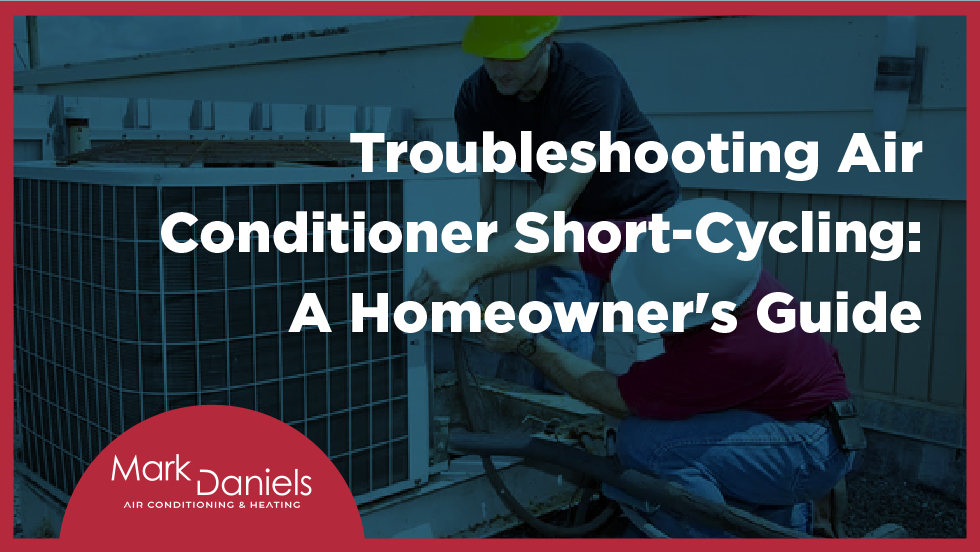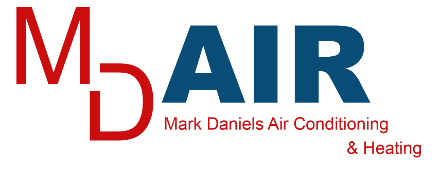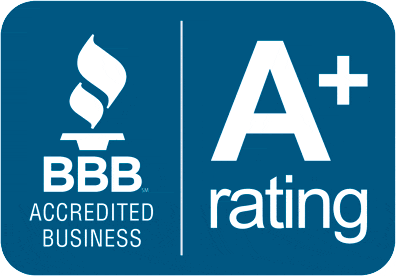Licensed | Bonded | Insured

Troubleshooting Air Conditioner Short-Cycling: A Homeowner’s Guide
Is your air conditioner acting up, constantly turning on and off in short bursts?
If so, you’re likely experiencing something known as short-cycling.
This disrupts the comfort of your home and can lead to higher energy bills and potential damage to your HVAC system.
In this guide, we discuss the causes of air conditioner short-cycling.
We will explore troubleshooting methods and provide practical solutions to restore your cooling system’s efficiency.
This homeowner’s guide is your go-to resource for tackling air conditioner short-cycling issues head-on.
Keep reading for information on finding a reputable HVAC service provider near you.
Understanding Air Conditioner Short-Cycling
Short-cycling is more than just an annoyance.
It’s a symptom of underlying issues within your HVAC system.
This occurs when your air conditioner turns on and off frequently, often in intervals shorter than its normal cooling cycle.
Short-cycling can be caused by various factors, including issues with the:
- Thermostat
- Refrigerant levels
- Mechanical components of the HVAC system
Potential Causes of Short-Cycling
HVAC systems can short cycle due to various reasons. Here are some potential causes to consider:
Incorrectly Sized HVAC System and Dirty Air Filters
If the HVAC system is too big for the space intended to heat or cool, it may reach the desired temperature too quickly.
This can force the unit to shut off prematurely, causing short-cycling.
Clogged, dirty air filters restrict airflow, which can typically cause the system to overheat and shut down ahead of schedule to prevent any damage to the unit.
Thermostat Issues
The thermostat, the brain of your HVAC system, may be misreading the temperature or experiencing technical glitches.
A malfunctioning thermostat can send the wrong signals to the system, causing your AC to turn on and off at inappropriate times.
Refrigerant Leaks
Low refrigerant levels can lead to improper cooling.
If this occurs it will cause the system to short cycle as it struggles to maintain the desired temperature.
Blocked Air Vents or Registers
Blocked or closed air vents and registers can disrupt airflow.
This blockage can lead to temperature fluctuations and short-cycling.
Faulty Components
Issues with components such as the compressor, blower motor, or capacitors can cause the system to malfunction and short cycle.
Poor installation can result in incorrect duct sizing, improper refrigerant charge, or other issues that contribute to short-cycling.
High Static Pressure
If the ductwork is too small or there are restrictions in the duct system, it can create high static pressure.
This will force the system to shut down prematurely.
Proper duct design and AC maintenance can help prevent high static pressure and minimize the risk of short-cycling.
Outdoor Unit Obstructions
An obstructed compressor can cause short-cycling, disrupting your HVAC system’s operation.
Debris, vegetation, or other obstructions around the outdoor unit can also restrict airflow, worsening this issue.
Regularly clearing any obstructions around the outdoor unit can help maintain proper airflow and prevent short-cycling.
Electrical Problems
Issues with electrical connections, wiring, or circuit breakers can interrupt the normal operation of the HVAC system and lead to short-cycling.
Regular inspections and prompt repair of any electrical issues can help prevent short-cycling and ensure the safe operation of the HVAC system.
Consequences of Short-Cycling
Short-cycling can have several negative effects. These can include things such as:
- Reduced energy efficiency
- Increased wear and tear
- Poor indoor air quality
- Decreased lifespan of equipment
- Higher maintenance costs
- Overworked compressor
Overall, addressing short-cycling is essential to prevent these consequences and ensure the optimal operation of your HVAC system.
AC System Troubleshooting
Let’s roll up our sleeves and tackle short-cycling head-on with these practical troubleshooting steps:
Check your thermostat settings.
Ensure your thermostat is set to the correct temperature and mode and free from obstructions that could interfere with its operation.
Replace the batteries if necessary.
Inspect the refrigerant levels. Schedule a professional HVAC service to check refrigerant levels and address any leaks or deficiencies.
Do not try to recharge the refrigerant yourself, as this requires specialized equipment and expertise.
Clear the compressor area.
Keep the area around your outdoor compressor clean and free of obstructions to allow for good airflow and limit the chances of overheating.
Regularly replace air filters to promote airflow and prevent dirt buildup that can lead to short-cycling.
Regularly replace all air filters according to manufacturer recommendations to maintain airflow and prevent dirt and debris buildup that can lead to short-cycling.
Seeking Professional HVAC Services
If DIY troubleshooting doesn’t resolve the issue, it’s time to call in the experts.
A qualified service provider can diagnose any specific issue quickly and correctly.
They can inspect your HVAC system, diagnose underlying issues, and repair or adjust items to restore optimal performance.
Maximizing Energy Efficiency
Addressing short-cycling not only improves comfort but also helps you save on energy costs.
Consider these energy-efficient tips to maximize your HVAC system’s performance:
Invest in a Programmable Thermostat
Upgrade to a programmable or smart thermostat.
This allows you to schedule temperature settings based on your daily routine, optimizing energy usage and reducing short-cycling.
Upgrade to High-Efficiency Equipment
If your air conditioner is older or inefficient, consider upgrading to a newer, high-efficiency model.
New units use less energy and operate more effectively, reducing the likelihood of short-cycling.
Seal and Insulate
Seal any air leaks around the doors, windows, and ductwork.
This will ensure proper insulation in your home, minimizing energy waste and maintaining consistent indoor temperatures.
Take the time to educate yourself on basic HVAC principles and best practices to ensure your system operates efficiently and reliably.
Addressing Air Conditioner Short-Cycling Effectively
Air conditioner short-cycling may be a common issue, but it’s not one you have to endure.
By following the troubleshooting steps outlined in this guide, you will be able to keep your AC running smoothly and your home cool and comfortable year-round.
For HVAC services in Mesa, Arizona, choose Mark Daniels Air Conditioning & Heating.
We are committed to doing things right at a fair price, so you can be sure of excellent service and peace of mind.
Contact us today to schedule an appointment and say goodbye to short-cycling frustrations.
Seeking air conditioning companies in Gilbert? Look no further! Trust Mark Daniels Air Conditioning & Heating for reliable solutions. Our team at Mark Daniels Air Conditioning & Heating offers expert maintenance and expert insight to all your HVAC needs across the Valley. Call (480) 571-7219 or request service online now!



